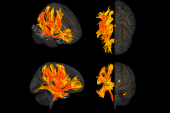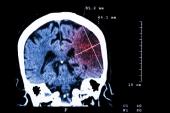Early Coronary Heart Disease Linked to Later Dementia, Alzheimer’s
(UPDATED) The data are observational, but they pose a quandary for physicians treating younger patients with coronary disease.

People who develop coronary heart disease (CHD) early in life are at a significantly increased risk of dementia, Alzheimer’s disease, and vascular dementia, according to results from a new observational study.
The risk of dementia is even more pronounced in those who developed CHD before midlife, say investigators.
“For clinical practice, our findings suggest, apart from traditional treatment for CHD, additional attention should be paid to the cognitive status of patients with CHD, especially the ones diagnosed with CHD at a young age, during their follow-up visits in healthcare settings,” according to Jie Liang, BS (Chinese Academy of Medical Sciences and Peking Union Medical College, Beijing, China), and colleagues. “In addition, timely intervention, such as cognitive training, could be implemented once signs of cognitive deteriorations are detected.”
Albert Hofman, MD, PhD (Harvard T.H. Chan School of Public Health, Boston, MA), who has studied the association between cardiovascular disease and dementia, said there is “quite a strong link” between various vascular risk factors and the occurrence of dementia and Alzheimer's disease that has been known for decades, if not longer.
“The big picture here is that what is good for your heart—good blood pressure control, lipids, cardiometabolic health, and of course no smoking, along with physical activity and [healthy] nutritional habits—are also good for your brain,” Hofman told TCTMD. “The overall idea now is that 30% to 40% of dementia and Alzheimer's disease can be prevented when we have a very appropriate assessment of these vascular factors.”
Prevention in the context of cognitive diseases such as dementia and Alzheimer’s means that onset shifts to later in life, so that people live healthier for longer before dying from other causes, he said.
Data From UK Biobank
The study, which was published this week in the Journal of the American Heart Association, is based on 432,557 adults (mean age 56.9 years) enrolled in the UK Biobank study. Of these, 11.7% had a CHD diagnosis, a group that was older and tended to have higher body mass index, higher systolic blood pressure, higher glycated hemoglobin levels, and a higher proportion with hypertension, diabetes, and statin use than those without CHD.
During a median follow-up of 12.8 years, participants with CHD had a significantly higher risk of all-cause dementia (HR 1.36; 95% CI 1.28-1.45), Alzheimer’s disease (HR 1.13; 95% CI 1.02-1.24), and vascular dementia (HR 1.78; 95% CI 1.56-2.02) than those without CHD.
The risk of dementia was even higher in patients who developed CHD at an earlier age. For each 10-year decrease in the onset of CHD, the risk of dementia, Alzheimer’s disease, and vascular dementia increased by 25%, 29%, and 22%, respectively. When compared with patients 60 years and older diagnosed with CHD, those who developed coronary disease between 45 and 59 years had a 32% higher risk of dementia, while those diagnosed with CHD at 45 years or younger had a 71% higher relative risk. The same age-based associations were observed with Alzheimer’s disease and vascular dementia.
Finally, the researchers performed a propensity-matched analysis in 100,692 individuals showing that coronary disease diagnosed before age 45 years was associated with a more than twofold increased risk of incident dementia (HR 2.40; 95% CI 1.79-3.20) when compared with similarly aged people without CHD. Those with CHD diagnosed at 45-59 years and 60 years and older had a 46% and 11% increased of CHD, respectively. The results were similar for Alzheimer’s disease and vascular dementia.
“The most important finding of the present study is the association of age at CHD onset with incident dementia,” according to Liang and colleagues, noting that the results are in line with other studies showing that a younger age of CHD or cardiovascular disease onset was associated with dementia or cognitive deterioration.
“The present findings have important public health implications as they contribute to ascertaining vulnerable populations with dementia by revealing that adults diagnosed with CHD at younger ages, especially before midlife (aged < 45 years), might be the most vulnerable to future dementia,” they write.
Frank Wolters, MD, PhD (Erasmus University Medical Center, Rotterdam, the Netherlands), who published a meta-analysis of 16 studies showing that a history of CHD was associated with a significantly increased risk of dementia, as was a history of heart failure, said vulnerability to dementia in CHD patients is expected given the large contribution of vascular brain injury to cognitive decline and dementia.
“Even in a large share of older people with Alzheimer’s disease, vascular brain injury plays an important role in their cognitive complaints,” he told TCTMD. “What’s interesting and new about this study, though, is that it shows that age matters. The earlier CHD manifested, the higher the subsequent risk of dementia. This seems to imply that prevention of CHD could in fact also postpone or prevent dementia onset.”
Wolters said that cognitive impairment is quite common among patients with heart disease and often goes unrecognized by their treating physicians. Earlier this year, he and others published a review in Stroke that recommended a stepwise approach to detection and management of cognitive impairment in patients with heart disease.
“Set aside the cognitive well-being, this also has implications for cardiovascular care, for example due to lower treatment adherence,” he said. “I think it is important that doctors are aware of this and have a low threshold for screening.” Such screening tools could include the Montreal Cognitive Assessment test or Mini-Mental State Examination, he said, or physicians could consult a neurologist or geriatrician if deemed helpful.
Mechanisms Unclear
To TCTMD, Hofman said that one limitation of the UK Biobank data is the potential for diagnostic bias.
“Most people who are in this [field] are a bit skeptical about the diagnosis of Alzheimer's disease and dementia that you have in the UK Biobank,” said Hofman. “It’s an overall diagnosis, a diagnosis made in people who have clear signs of cognitive decline already.”
In contrast, a diagnosis might not be made in patients where symptoms are more nuanced or less obvious. In fact, there is research from UK Biobank showing that a diagnosis of dementia more common in patients diagnosed with cancer, likely because these individuals are in more frequent contact with the healthcare system. “There’s a quite a bit of room and space for selection bias,” said Hofman.
Nonetheless, the association between cardiovascular disease and dementia seen in the present study parallels past research, he said. The mechanism linking CHD and dementia isn’t fully known, he said, but there are several theories.
First, CHD and dementia may share many risk factors that could lead to atherosclerosis that results in cerebral hypoperfusion. Cerebral hypoperfusion is a major cause of vascular dementia, but Hofman said it might also play a role in Alzheimer’s disease and dementia by causing apoptosis and neurodegeneration. In their paper, the researchers point out that cardiovascular risk factors might also provoke adverse immune responses and endothelial dysfunction, which could lead to the neurodegenerative changes in the brain, such as beta-amyloid deposition.
Additionally, the presence of long-term cardiovascular disease could result in cerebral small-vessel diseases, such as lacunar infarcts or microinfarcts, that play a role in cognitive decline and dementia. High blood pressure, particularly in midlife, has long been known to be associated with dementia and Alzheimer’s disease, but a recent study suggested that blood pressure variability might be particularly important predictor of future risk, said Hofman.
“A focus on stabilizing blood pressure may be particularly good for the risk dementia and Alzheimer's disease,” he said. “It’s not been formally studied, there have been no trials to date, but the evidence from cardiovascular studies in hypertension suggest that this may be a good approach.”
Michael O’Riordan is the Managing Editor for TCTMD. He completed his undergraduate degrees at Queen’s University in Kingston, ON, and…
Read Full BioSources
Liang J, Li C, Gao D, et al. Association between onset age of coronary heart disease and incident dementia: a prospective cohort study. J Am Heart Assoc. 2023;12:e031407.
Disclosures
- The authors report no relevant conflicts of interest.





Comments